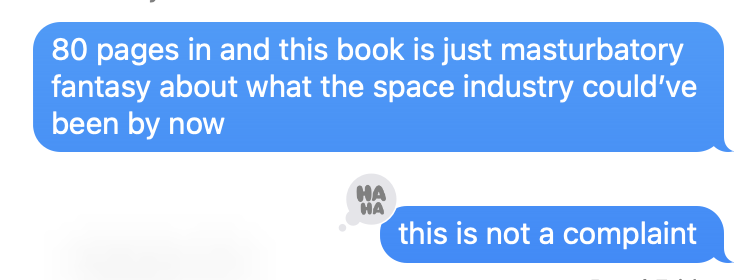The ‘jumping the shark’ moment for this book was in the appearance of one of the Pern books in-universe. A bit on the nose to have your “fantasy setting, but it’s actually another planet that got colonized by humans before the big civilization collapsed” book feature, as one of the Ancient Artifacts… a book about the exact same concept. In this case, the threat is still unknown, but we do get to see it, and it’s a bit more… active than thread.
That said, I did really enjoy the setting; I’m a firm believer in the whole “any sufficiently advanced technology is indistinguishable from magic” thing, and dropping the general level of technology available to people lowers the threshold on “sufficiently advanced” enough to make it more recognizable.
It also helps that the love arc here was just… hilarious. I quite liked all the characters, and seeing them interact, but the fact that there’s at least one love triangle, one member of whom keeps thinking about jumping ship to a different love triangle, makes it fun.
Overall, I quite enjoyed the book; my main complaint is that it’s an entire book’s worth of setup, and the payoff is going to happen in, presumably, the third book of the trilogy. I’d rather one long book to three medium-short ones. Still, a fun little fantasy/science fiction thing, worth a try.1
- This is a Bookshop affiliate link – if you buy it from here, I get a little bit of commission. It won’t hurt my feelings if you buy it elsewhere; honestly, I’d rather you check it out from your local library, or go to a local book store. I use Bookshop affiliate links instead of Amazon because they distribute a significant chunk of their profits to small, local book stores. ↩
